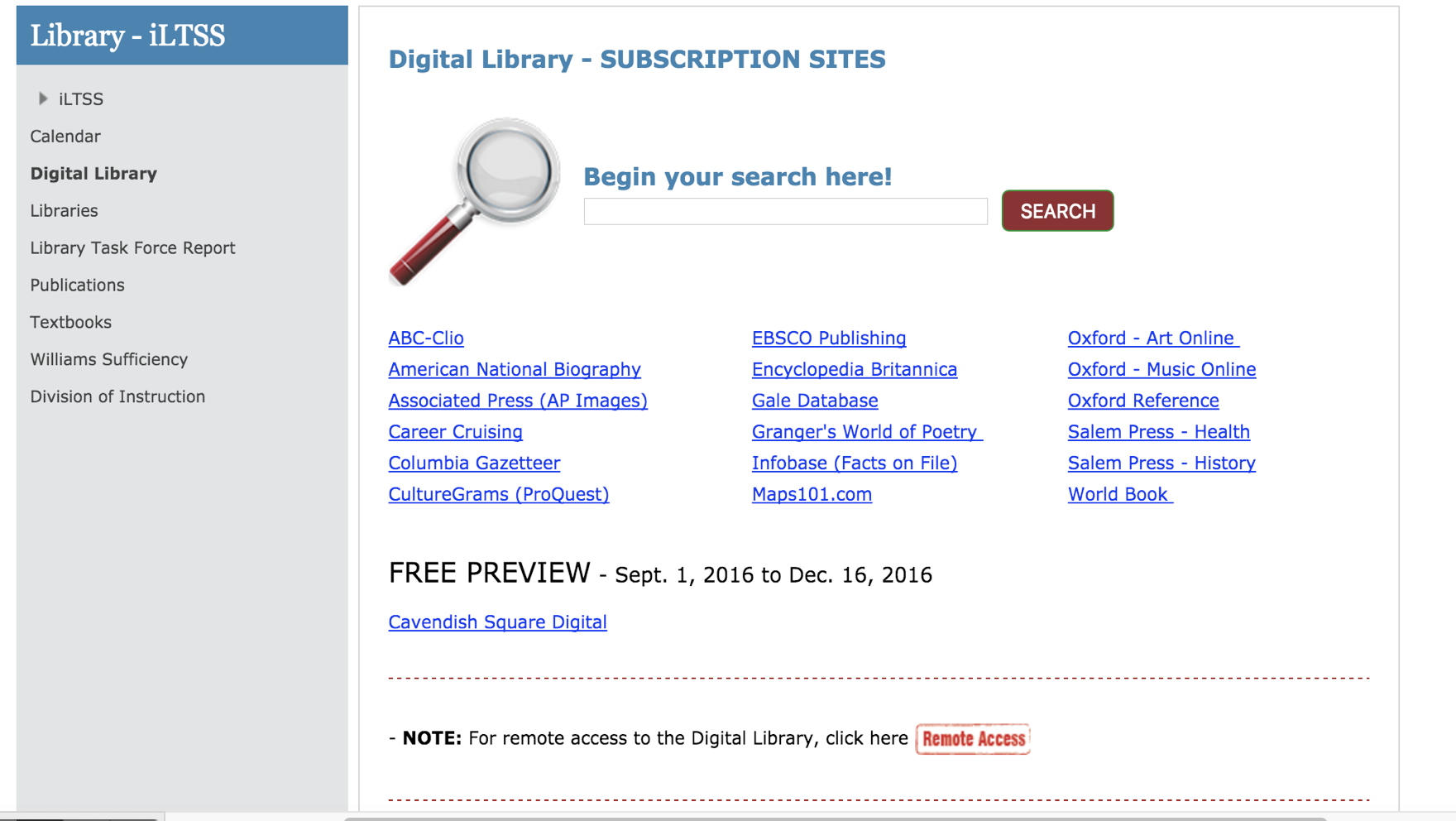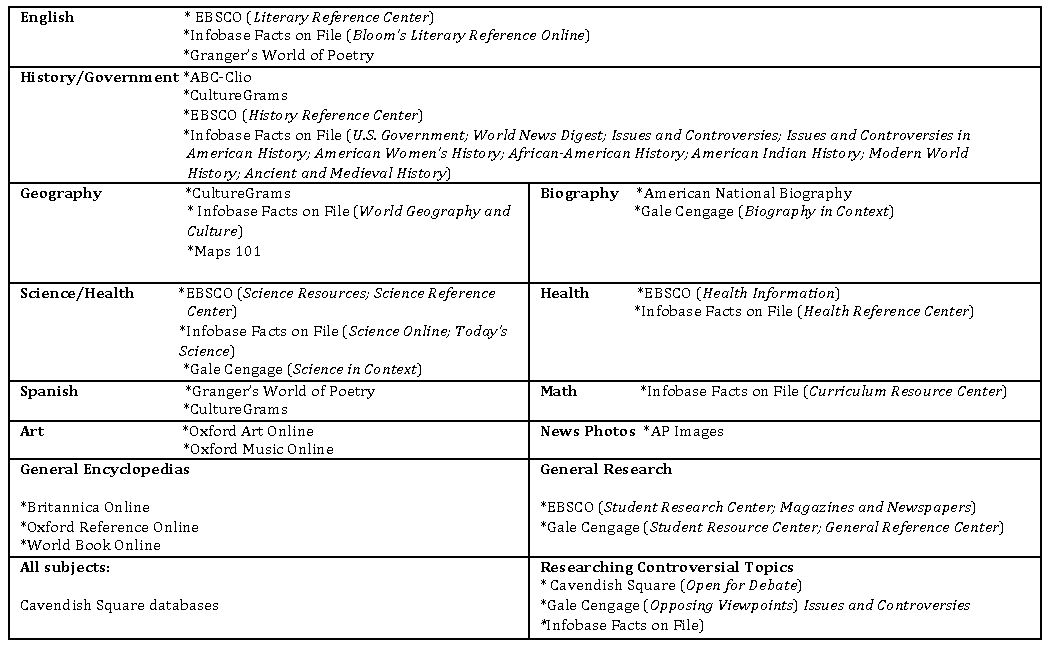LAUSD's Digital Library. What is it?
The Digital Library contain a group of databases as well as free sites to help students find credible resources for their research. A database collects information in a way that allows us to find it ore easily. Our Digital Library collection arranges groups of databases together depending on the host of the database or the subject of the databases. The guide below gives an overview of those groups. The Los Angeles Public Library also has databases that may be extremely useful for some tasks, but many of these will require that the user have a library card (which is free!).
How to Access the Digital Library
You can access the entire LAUSD Digital Library from our library website. When off campus, you will have to click on the “Remote Access” button and sign with your LAUSD SSO (for teachers, this is your SSO; for students, this is your LAUSD email and password). If you are a student and need help doing this, please see me or use our SSO Activation guide.
There are so many resources! Which database should I use?
Your information need will determine which resources you use. What is your assigned task? What is the problem you need to solve?
The Digital Library:
For a printable guide to the Digital Library by subject as well as a guide for when to use subscription databases, click here.
Brief descriptions of the DL collections are below:
(S)=Resources in Spanish
Encyclopedias:
World Book (S) and Britannica
Great starting point. They will give you an overview of your subject.
Features:
Current, reliable, and the information has been verified
Written at different reading levels
Spanish version (World Book)
Teacher/Common Core Resources (Britannica)
Databases:
ABC-CLIO
Need information about american history and government?
This subscription provides court cases, statistics, and multimedia clips about topics such as the branches of government,
foreign policy, and U.S. history. It contains encyclopedia articles, journal articles, news articles, cultural documents, government documents, and archival images, and it allows you to filter results by type of source.
American National Biography
Portraits of over 18,700 Americans.
Features:
Search by name or research topics (i.e. Women’s History or Hispanic American Heritage).
Teacher’s guide for integrating into curriculum and aligning lessons to the CCSS.
Associated Press (AP) Images
Photos owned by Associated Press.
Features:
Grouped by historical and current events and people.
Easy to cite
NOT free to be used in other types of work
Career Cruising
Need career information? This subscription finds careers that match the user's interests and provides information
about those careers.
Features:
Multimedia interviews with people in that career
Information about related educational programs
Users may research career options and outlooks, obtain information on tasks, workplace, salary ranges, outlook by state,
and required education.
Contains assessments to match students to jobs and school programs
Provides a Spanish version and a portfolio section.
Columbia Gazetteer
A geographic encyclopedia
Features:
Searchable by type of place, state or province, country, continent, population or geographic coordinates. Information about places and political entities
Current and historical information
Easy citation tool
CultureGrams
Learn about the culture of a country!
Great to use with the Gazetteer and Facts on File.
EBSCO
Great for a variety of topics.
Search features: full-text, peer-reviewed, publication date, etc.
Contains:
The databases in this group focus on specific topics (i.e. Issues & Controversies, American Women’s History, Bloom’s Literary Reference Online). These databases provide user-friendly interfaces that feel more like web browsing that a traditional database, but they still provide in-depth searches. The World Almanac in this group also allows the user to sort search results by primary and secondary sources.
Gale Databases
These databases are organized by subject, containing reference sources for biography, literature, and science, as well as a database called Opposing Viewpoints In Context. This is a great tool for persuasive assignments,
Features:
Focuses on social issues
Provides information on many current topics
Provides statistics, reference sources, and editorial perspectives
Granger’s World of Poetry
Anything dealing with the art of poetry can be found here.
Features:
Search by subject, biographies, commentaries, history & criticism, and sources (books or journals)
Includes some full poems, a glossary of poetic terms, and a listening room
Easy citation
Maps101.com (S)
Conduct specific searches or browse by subjects (Geography, History, Earth Science, & Civics) or collections (i.e. Antique Maps, Physical Maps, U.S. Congressional Districts). There is even a section of maps in Spanish for ELL classes or Spanish classes.
Oxford (Grove) Art Online and Oxford (Grove) Music Online
These are other specialized groups of databases that focus art or music.
Oxford (Grove) University Press
You may browse through these sources by subject or reference type. This may be most useful if you already have a focused topic, since it is more of an encyclopedia/database hybrid.
Salem Press – Health and Salem Press- History
These two sites are also specialized and collect sources from various publications on their topics (health and history), but only fro Salem Press reference sets.
The Digital Library contain a group of databases as well as free sites to help students find credible resources for their research. A database collects information in a way that allows us to find it ore easily. Our Digital Library collection arranges groups of databases together depending on the host of the database or the subject of the databases. The guide below gives an overview of those groups. The Los Angeles Public Library also has databases that may be extremely useful for some tasks, but many of these will require that the user have a library card (which is free!).
How to Access the Digital Library
You can access the entire LAUSD Digital Library from our library website. When off campus, you will have to click on the “Remote Access” button and sign with your LAUSD SSO (for teachers, this is your SSO; for students, this is your LAUSD email and password). If you are a student and need help doing this, please see me or use our SSO Activation guide.
There are so many resources! Which database should I use?
Your information need will determine which resources you use. What is your assigned task? What is the problem you need to solve?
The Digital Library:
For a printable guide to the Digital Library by subject as well as a guide for when to use subscription databases, click here.
Brief descriptions of the DL collections are below:
(S)=Resources in Spanish
Encyclopedias:
World Book (S) and Britannica
Great starting point. They will give you an overview of your subject.
Features:
Current, reliable, and the information has been verified
Written at different reading levels
Spanish version (World Book)
Teacher/Common Core Resources (Britannica)
Databases:
ABC-CLIO
Need information about american history and government?
This subscription provides court cases, statistics, and multimedia clips about topics such as the branches of government,
foreign policy, and U.S. history. It contains encyclopedia articles, journal articles, news articles, cultural documents, government documents, and archival images, and it allows you to filter results by type of source.
American National Biography
Portraits of over 18,700 Americans.
Features:
Search by name or research topics (i.e. Women’s History or Hispanic American Heritage).
Teacher’s guide for integrating into curriculum and aligning lessons to the CCSS.
Associated Press (AP) Images
Photos owned by Associated Press.
Features:
Grouped by historical and current events and people.
Easy to cite
NOT free to be used in other types of work
Career Cruising
Need career information? This subscription finds careers that match the user's interests and provides information
about those careers.
Features:
Multimedia interviews with people in that career
Information about related educational programs
Users may research career options and outlooks, obtain information on tasks, workplace, salary ranges, outlook by state,
and required education.
Contains assessments to match students to jobs and school programs
Provides a Spanish version and a portfolio section.
Columbia Gazetteer
A geographic encyclopedia
Features:
Searchable by type of place, state or province, country, continent, population or geographic coordinates. Information about places and political entities
Current and historical information
Easy citation tool
CultureGrams
Learn about the culture of a country!
Great to use with the Gazetteer and Facts on File.
EBSCO
Great for a variety of topics.
Search features: full-text, peer-reviewed, publication date, etc.
Contains:
- Student Research Center: High School database that draws from a variety of sources: newspapers, magazines, encyclopedias, radio and T.V. news etc. and deals with many topics, including social issues. This database is good for browsing and research.
- Literary Reference Center : This database contains resources pertaining to everything about literature: author biographies, literary criticism, and full-versions of classic works.
- Magazines & Newspapers: Search up to 9 different databases at the same time that include newspapers, magazines, academic journals, public opinion polls, reference materials, and images. It covers a wide variety of topics and social issues. This is a great one to use once you have narrowed down your topic.
- ELL Resource Center: This allows ELL students to access articles written with ELL needs in mind. It provides syntax to support comprehension and vocabulary development, and includes features such as audio for portions text and useful guides and worksheets.
The databases in this group focus on specific topics (i.e. Issues & Controversies, American Women’s History, Bloom’s Literary Reference Online). These databases provide user-friendly interfaces that feel more like web browsing that a traditional database, but they still provide in-depth searches. The World Almanac in this group also allows the user to sort search results by primary and secondary sources.
Gale Databases
These databases are organized by subject, containing reference sources for biography, literature, and science, as well as a database called Opposing Viewpoints In Context. This is a great tool for persuasive assignments,
Features:
Focuses on social issues
Provides information on many current topics
Provides statistics, reference sources, and editorial perspectives
Granger’s World of Poetry
Anything dealing with the art of poetry can be found here.
Features:
Search by subject, biographies, commentaries, history & criticism, and sources (books or journals)
Includes some full poems, a glossary of poetic terms, and a listening room
Easy citation
Maps101.com (S)
Conduct specific searches or browse by subjects (Geography, History, Earth Science, & Civics) or collections (i.e. Antique Maps, Physical Maps, U.S. Congressional Districts). There is even a section of maps in Spanish for ELL classes or Spanish classes.
Oxford (Grove) Art Online and Oxford (Grove) Music Online
These are other specialized groups of databases that focus art or music.
Oxford (Grove) University Press
You may browse through these sources by subject or reference type. This may be most useful if you already have a focused topic, since it is more of an encyclopedia/database hybrid.
Salem Press – Health and Salem Press- History
These two sites are also specialized and collect sources from various publications on their topics (health and history), but only fro Salem Press reference sets.


